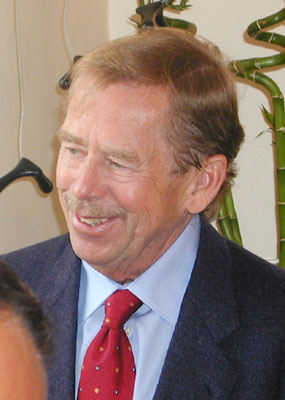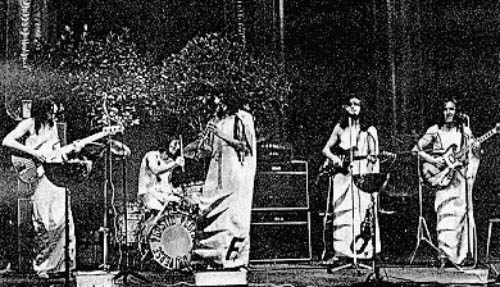The most popular song of 1968 was "Hey Jude" and to the ears of the Czechs and Slovaks it must have sounded deliciously meddlesome. McCartney's shrill yelps. The thump-clang percussion. Its orgasmic coda. "Hey Jude" was seven minutes of subversion openly broadcast over the radio in a Soviet satellite. This was the Prague Spring. A time when a progressive leader, Alexander Dubcek, took power and reformed the draconian restrictions of Mother Russia. Censorship of the state press was lifted so dissidents could express their views free of harassment, new independent political parties challenged the one-party system, bands performed without the impediment of state registration, and radio exhibited a distinctly Western rebirth. It was only a matter of time before Czechoslovakia was liberated from the Soviet Union's manacles.
Then it ended. In August of that year Soviets rolled their tanks into Prague killing dozens and squashing the reforms enacted during the Prague Spring. They reasserted their control, "normalizing" the media of Western influence. These changes extended into the artistic sphere, limiting the range of content of writers and forcing musicians to once again earn state approval before gaining professional status. Many bands complied and softened their material to fit cleanly inside Soviet parameters, but a small underground movement refused to compromise. The most important of these groups was The Plastic People of the Universe.
Taking their name from the Frank Zappa song, "Plastic People", the Plastics channeled the kaleidoscopic silliness of early Zappa and the Mothers of Invention as well as the dark caterwauling of the Velvet Underground. The music was too challenging, and they were labeled "morbid" and denied professional status by the state, prohibiting them from making money off their music.
But they didn't stop, instead the Plastics found chinks in the Soviet armor. For example, a friend of the band, a professor, would deliver a ten minute lecture about the music of the Velvet Underground or the Fugs then invite the Plastics to demonstrate the songs for the last few hours of the presentation. They performed at weddings, a couple even remarried in order to give the Plastic People a venue. Information about these events was spread in secret by word of mouth and shows were set in secluded locations such as farms and forests. Despite this forethought the police often discovered and shut down the events at times beating and arresting audience members. This pattern continued culminating into what became known as "Magor's Wedding", a festival helmed by the Plastics who wanted to launch the "Second Culture" and refurbish their society through rock music. In attitude, this was to be the Czech Woodstock, the police responded by arresting the band and confiscating their equipment.
 In attendance at the Plastic People's trial was a playwright and poet who witnessed the birth and death of the Prague Spring. His name is Vaclav Havel and the misconduct of the court so incensed the young firebrand that he penned a petition entitled "Charter 77". In short, Charter 77 was "ask[ing], simply, that the Czechoslovak government adhere to the Final Act of the 1975 Helsinki Agreement -- specifically its covenants on civil, political, and economic rights -- to which it had recently become a signatory." (source) This act was indeed revolutionary. The government jailed Havel for his "crime" but the deed was done. Charter 77 lent guidance and hope not only to his own countrymen but to the neighboring European countries who also wished to slide free of the Soviet stranglehold.
In attendance at the Plastic People's trial was a playwright and poet who witnessed the birth and death of the Prague Spring. His name is Vaclav Havel and the misconduct of the court so incensed the young firebrand that he penned a petition entitled "Charter 77". In short, Charter 77 was "ask[ing], simply, that the Czechoslovak government adhere to the Final Act of the 1975 Helsinki Agreement -- specifically its covenants on civil, political, and economic rights -- to which it had recently become a signatory." (source) This act was indeed revolutionary. The government jailed Havel for his "crime" but the deed was done. Charter 77 lent guidance and hope not only to his own countrymen but to the neighboring European countries who also wished to slide free of the Soviet stranglehold.At the tail end of the Soviet Union Charter 77 evolved into an outright revolution. Appropriately enough it was named the Velvet Revolution after one of the Plastic People of the Universe and Havel's favorite groups - the Velvet Underground. The Plastics still perform under the name Pulnoc, and Havel lead the revolution, and the country, after the Communist empire crumbled as well as becoming the first president of the Czech Republic.
Somehow artisans have been stereotyped as a flighty lot whose product should only benignly entertain. Too often people dismiss the potency of words or notes or images and those who arrange them. The idea that a rock group or poet could provoke authentic change is derided as immature daydreaming. But if these goalless punks never rise above the level of street magicians then why are they muzzled and jailed? Art is dangerous. Art is transformative. It explores the geography of our minds and illuminates the interiors of the human heart. It satisfies our hunger for a shared experience of interpersonal progress and because of that fact it is impossible to know when those books and albums might go nova and ignite the next revolution.



No comments:
Post a Comment